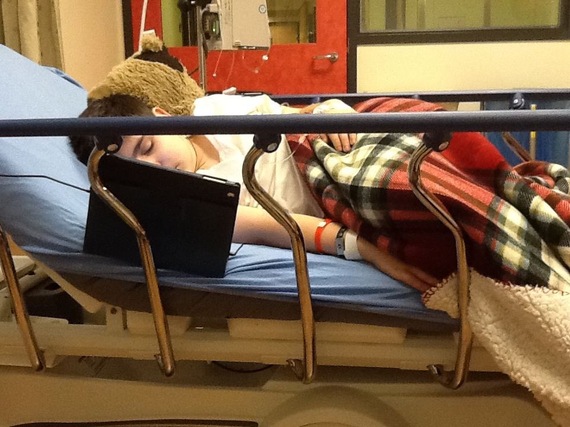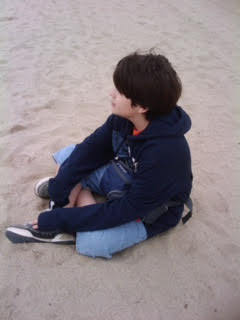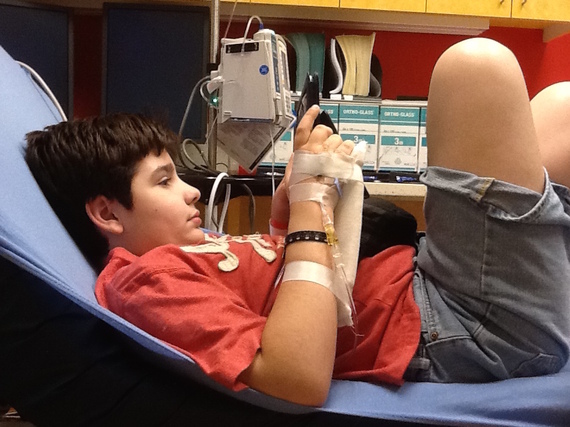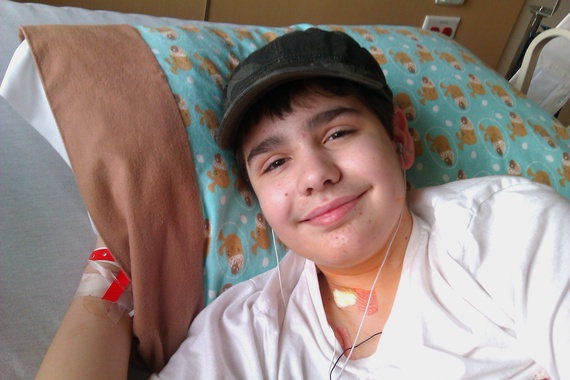When I earned my medical degree, I understood that it granted me the right to practice medicine. But over the years, I have learned that this degree has also given me the great honor and privilege to hear people's stories. I have been given a front row seat in the class of the human condition.
What I have learned is that our stories not only shape us, but they also have to power to transform those around us. So I wanted to share the stories of the patients who have touched our lives through the pediatric gastroenterology practice that I own with my husband.
Cameron's story is one of tenacity and resilience.
As parents, we are over joyed when a healthy newborn child enters our world. We have tremendous hope and envision grand dreams for our children. And while we understand that a human life is wired for struggle, we pray to avoid that helpless feeling that overcomes you when you witness your own child suffering.
If you want to be in the presence of strength, talk to a mother whose child has a chronic illness. Recently, I had the pleasure of talking with Cameron's mother, Vicky who gave me insight into the story that has changed their lives.
The Diagnosis
"When Cameron was two years old, it was apparent that he was extremely intelligent. We had to make a very challenging choice; put him into what we called the 'child prodigy' track, or let him have a normal childhood," writes Vicky. "We chose the normal childhood path, which was ripped away from him about a year later. We had no idea what was in store for him."
At the age of three, Cameron started having seizures and shortly thereafter, he had fine and gross motor issues. He also developed drooping of the upper eyelid called ptosis. The ophthalmologist recommended that Cameron see Dr. Richard Boles, a specialist in clinical genetics who diagnosed Cameron with mitochondrial disease: a rare, chronic, progressive inherited illness.
Our mitochondria are tiny parts in our cells that are responsible for the energy our body needs to sustain life and growth. Mitochondrial disease is a group of disorders that result when these powerhouses of our cells start to dysfunction. The symptoms of mitochondrial disease are different from patient to patient and they can present at any age. Varying from muscle weakness, learning disabilities, gastrointestinal issues and seizures, they progress with age.
"It is surreal," writes Vicky. "I equate it to the El Nino storms. The ebb and flow of this illness is not gentle. It comes on swiftly and with a vengeance, without regard for any responsibilities or aspects of one's life. It certainly isn't easy to live in a state that one would call hypervigilance, waiting for the next storm to hit, because it will."
On top of dealing with a chronic illness for which there is no cure, parents of children with mitochondrial disease must also navigate a complex medical system in which this disease is poorly understood.
"My greatest struggle with Cameron's diagnosis has been dealing with individuals who have no idea how it affects him. And no matter how much I explain things, some will never understand. It has been challenging to watch his academic abilities decline along with physical changes. When you deal with people who trivialize, marginalize or deny the veracity of his illness, you get very frustrated. When it happens repeatedly, you become your child's greatest advocate," says Vicky.
Letting Go of the Life We Plan
As a pediatrician, it is my patients and their families that have taught me the most about parenting. What I have learned from parents of children with chronic diseases is that life's greatest struggle comes from holding on to what you planned your life to be, instead of living in what it is right now.
"I think that many of us start out with visions of who our children will be, and what they will do. A chronic illness sweeps all of that away, and the end-goal becomes different. If it weren't so awful to deal with, it could be viewed as giving you a clean slate. Expectations are adjusted constantly. Over time, you learn to accept it and how it has altered your child's existence more gracefully. Your life becomes much more simple when your child is chronically ill. And it is OK, " says Vicky.
Cameron, now 16 years old, lives in a world where every action has an equal and opposite reaction. If he expends energy, he must also conserve it. Cameron was 12 years old when he got into a charter school, had great friends and was thriving. And then the next year, he could not tolerate a twenty-minute ride to school. He had very little contact with his friends and became more bedbound.
Vicky says, "our extremely bright three year old has turned into an extremely bright 16 year old who doesn't have the cognitive endurance to do school work. He has handled his diagnosis with grace beyond his years. Yes, he is angry. Yes, he is frustrated. But he has adapted. He is mature in ways you don't see in his age group. He has incredible gratitude for those who care for him. He accepts his illness better than the rest of us here."
As Maya Angelou said, "I can be changed by what happens to me. But I refuse to be reduced by it."
Gratitude in the Ordinary
Parents of children with chronic illnesses understand one thing: in the end, the bullet points on our resume or the grandeur of our house will pale in comparison to how much love surrounds us. So they are fiercely present when spending time with their children. They savor the ordinary moments.
"We try to focus on quality of life," says Vicky. "His life could be heartbreaking if we dwelled on challenges. So we try to put a positive spin on things. We use humor to make it through the day. His home hospital teacher comes to work with him to keep him connected to school. We have great wifi as he cannot read books any longer. He loves computer games and he can play those in his bed. He also reads factual information online, and like most 16 year olds, is developing his world view."
While most of us are out chasing the extraordinary, families dealing with chronic illnesses have learned to find gratitude in the ordinary.
Author and speaker Dr. Brené Brown has interviewed several people who have experienced profound loss. She said this,
And when I asked them, 'What do you miss the most? What's the hardest?' None of them said anything about the extraordinary moments that weren't going to happen. Every single person said, 'I wish I would have been paying more attention to the ordinary moments.' 'I wish I could hear my kids laughing in the backyard through the screen door.' 'I wish I could come downstairs and see my husband sitting at the table, pissed off because I bought the wrong brand of bread.' 'I wish I could get one of those wacky text messages from my mom again.'
It is in honoring those ordinary moments that make life extraordinary.
Love with No Guarantees
I have been given the great honor and privilege of hearing people's stories and they have deeply affected my own.
As I watched my daughter play at a park recently, I thought that I couldn't possibly love another being more. And then immediately, in my next thought, I began to worry. I worried about her future, I worried about her education, I worried if she would be safe, and I even worried if we had dinner for tomorrow night.
As I pulled out my phone to start making a grocery list, the first thing that appeared on my screen were my notes from Cameron's story.
What if I let go of the life that I am planning and live in the moment I have now?
What if I look into my daughter's eyes and share in her laughter and find gratitude in this most glorious ordinary moment?
It is patients like Cameron and mothers like Vicky who have taught me how to really be brave in the greatest arena of our lives: the arena of love.
As much as we want to protect our children, there are no guarantees. And yet we love anyways. When we talk about 'true' love, this is what it means- to dedicate a portion of your heart to another with no guarantee of the outcome.
And maybe this is our greatest story, and our greatest legacy: how we adapted to our lives in the present, honored the ordinary, and loved deeply and fully with no guarantees.
I thank all of the brave patients like Cameron and the inspiring parents like Vicky for sharing their stories and teaching me that.
This post originally appeared on DrB and DrM.
You can follow Smita on Facebook here.



